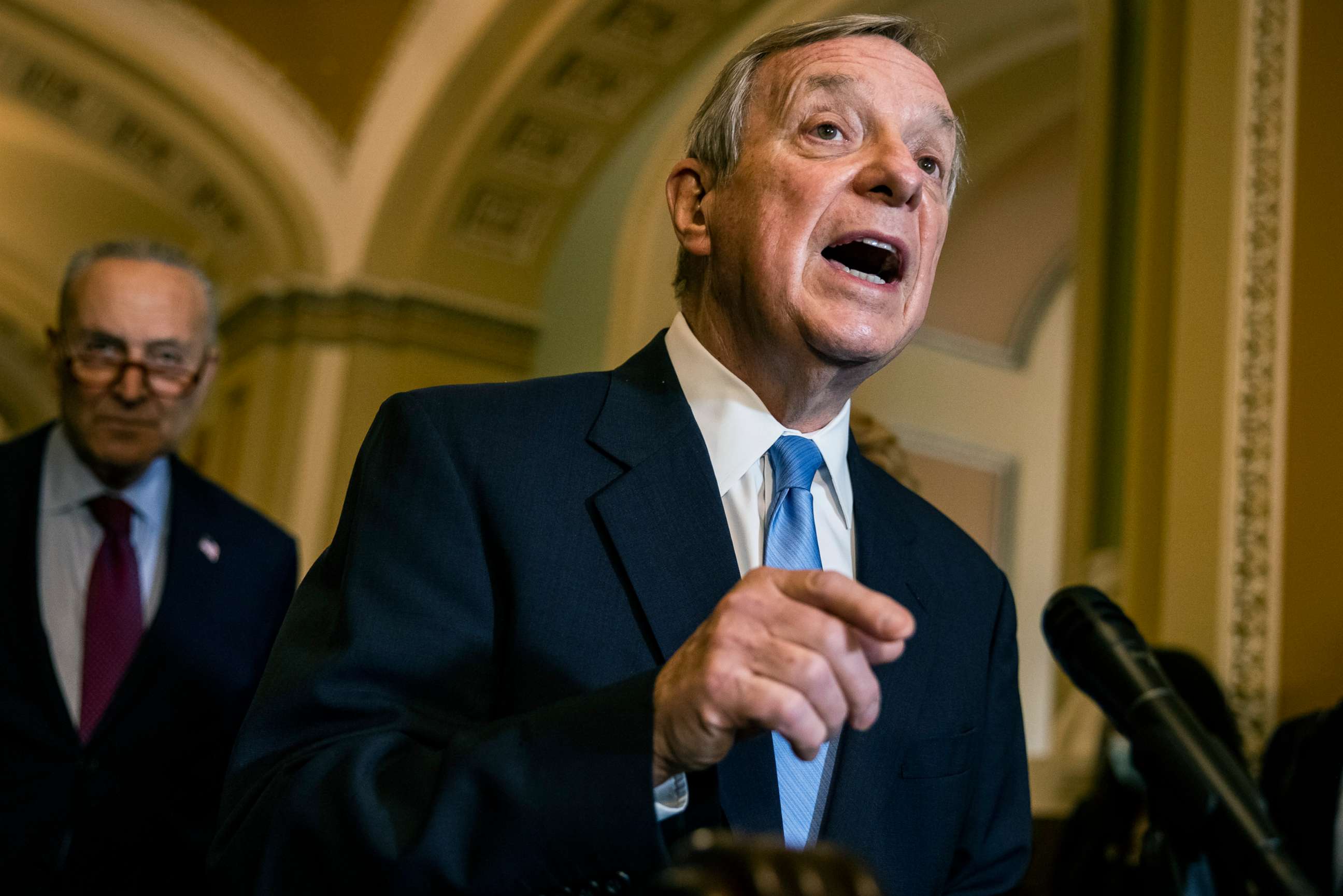Sen. Dick Durbin 'hopeful' Supreme Court nominee will get bipartisan support
Critics of the pledge to nominate a Black woman should "look back at history."
Senate Judiciary Committee Chair Dick Durbin, D-III., said he's "hopeful" that whoever is nominated to replace Justice Stephen Breyer on the Supreme Court will garner bipartisan support.

"I know (Sen.) Susan Collins is a guest on your show this morning. I've spoken to her. I'm reaching out to the Republicans and saying the nominee will be available for you to get to know them," Durbin told anchor George Stephanopoulos Sunday on ABC's "This Week."
Stephanopoulos noted that GOP Sens. Tim Scott and Chuck Grassley, the vice chair of the Judiciary Committee, think Biden should "pick a moderate who reflects the entire country, who reflects that close division in the Senate."
"Well... it was (Sen.) Mitch McConnell who decided that he would eliminate the filibuster on Supreme Court nominees," Durbin responded. "It used to take 60 votes. McConnell said no, let's make it a majority. And that meant that the selection process was more partisan than it had been in the past."
In 2012, then-Senate Majority Leader Harry Reid, D-Nev., carved out an exception to lower the threshold to a simple majority to confirm then-President Barack Obama's lower court judicial nominees. After Democrats invoked the filibuster to block the nomination of Judge Neil Gorsuch, McConnell in 2017 eliminated the filibuster for Supreme Court nominees, clearing the way for Gorsuch to be confirmed.
But Durbin expressed optimism some Republicans would ultimately support President Joe Biden's nominee.
Biden said he plans to decide on who to nominate by the end of February but has already announced he will nominate the first African American woman to the Supreme Court, fulfilling a campaign promise he made in 2020 to do so when a vacancy arose.
Durbin said he plans to "trust" Biden's judgment on his selection when asked if he had a favorite among the reported contenders, who include former Breyer clerk Judge Ketanji Brown Jackson of the D.C. Circuit Court of Appeals, Judge Leondra Kruger of the California Supreme Court, U.S. District Judge Leslie Abrams Gardner of Georgia and U.S. District Judge J. Michelle Childs of South Carolina.
Stephanopoulos pressed Durbin on what can be expected regarding the confirmation timeline, as Breyer announced plans to stay on the court until the end of term.
"Lay out your timeline for when these hearings could happen, when the President's pick could be confirmed?" Stephanopoulos asked.
"We'll be ready from a staff viewpoint and logistic viewpoint," Durbin responded.
"When he chooses a nominee and sends it to the Senate, then we're off and running. And that nominee and the background of the nominee in terms of where they've been before the committee, how recently they were there, and how much information we can bring together quickly will decide the timeline," he added.
Biden has received criticism from many Republicans on his decision to "nominate a Black woman to the Supreme Court." Former U.S. Ambassador to the United Nations Nikki Haley tweeted that the Supreme Court nominee should be "qualified without a race/gender litmus test." And an ABC News/Ipsos poll published Sunday found 76% of Americans think Biden should consider all possible nominees, rather than only Black women to follow through on his history-making commitment.
Durbin addressed these concerns head-on, saying "take a look back at history."
"Recall that it was Ronald Reagan who announced that he was going to appoint a woman to the Supreme Court and he did, Sandra Day O'Connor. And it was Donald Trump who announced that he was going to replace Ruth Bader Ginsburg with a woman nominee as well. So this is not the first time the president has signaled what they're looking for in a nominee," Durbin said.
"But," he said, "I'm still hopeful."
Durbin's hopes of bipartisan cooperation don't end with Biden's Supreme Court nominee. As Congress takes up reforming the Electoral College Act, Durbin says he believes that, too, can be achieved with support from both parties.
"I think it should be. There's an effort -- Susan's part of an effort to take a look at it with a bipartisan group. And I've joined with Amy Klobuchar and Angus King on the Democratic side. I think we're talking about the same basic challenges that we want to make sure the Electoral College is valid," Durbin said.
"And, of course, we have the disclosure this last week of the Jan. 6 Committee in the House looking into false slates of electors that are being selected in seven or eight states in the last election -- in the last presidential election," he added.



